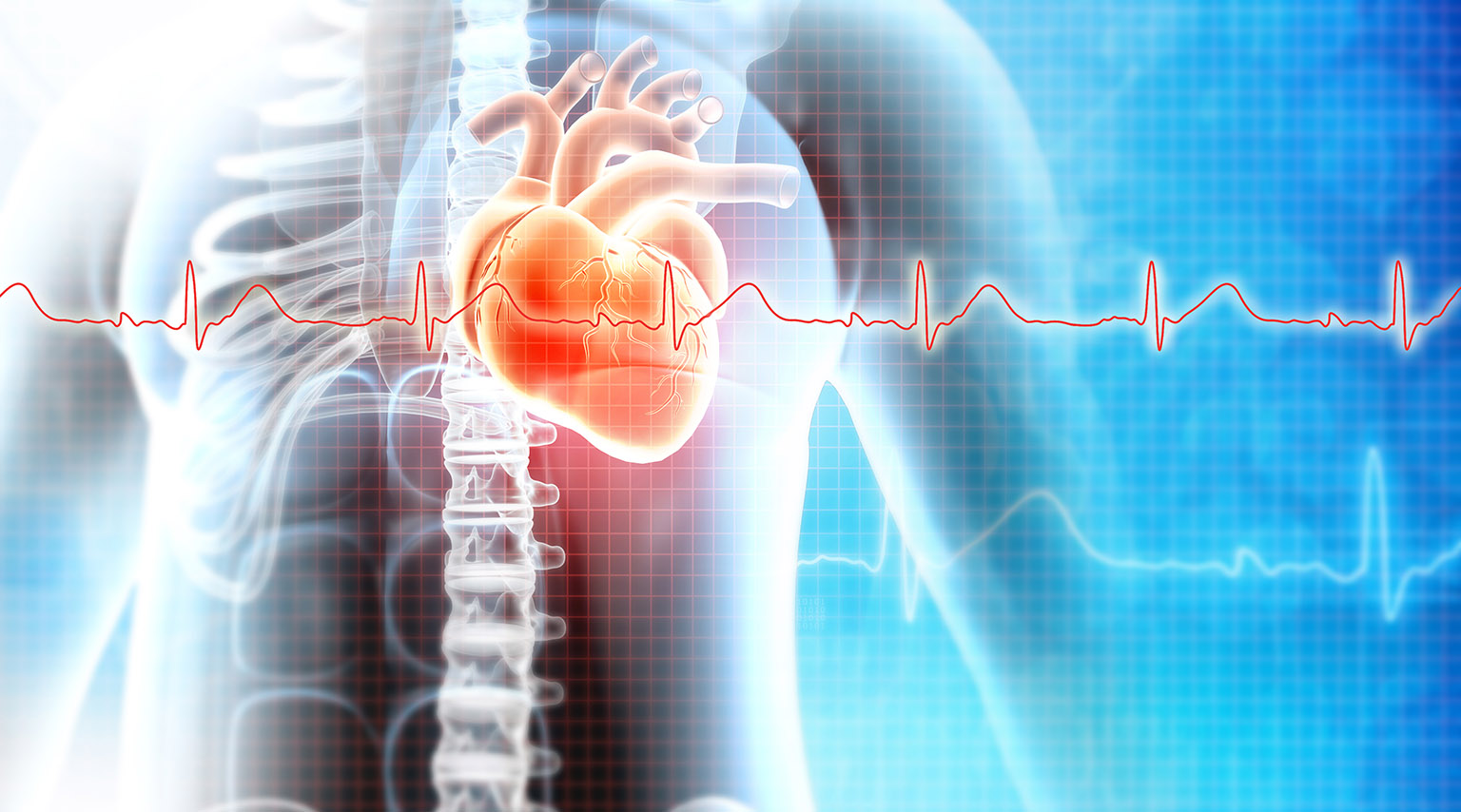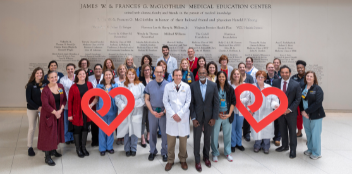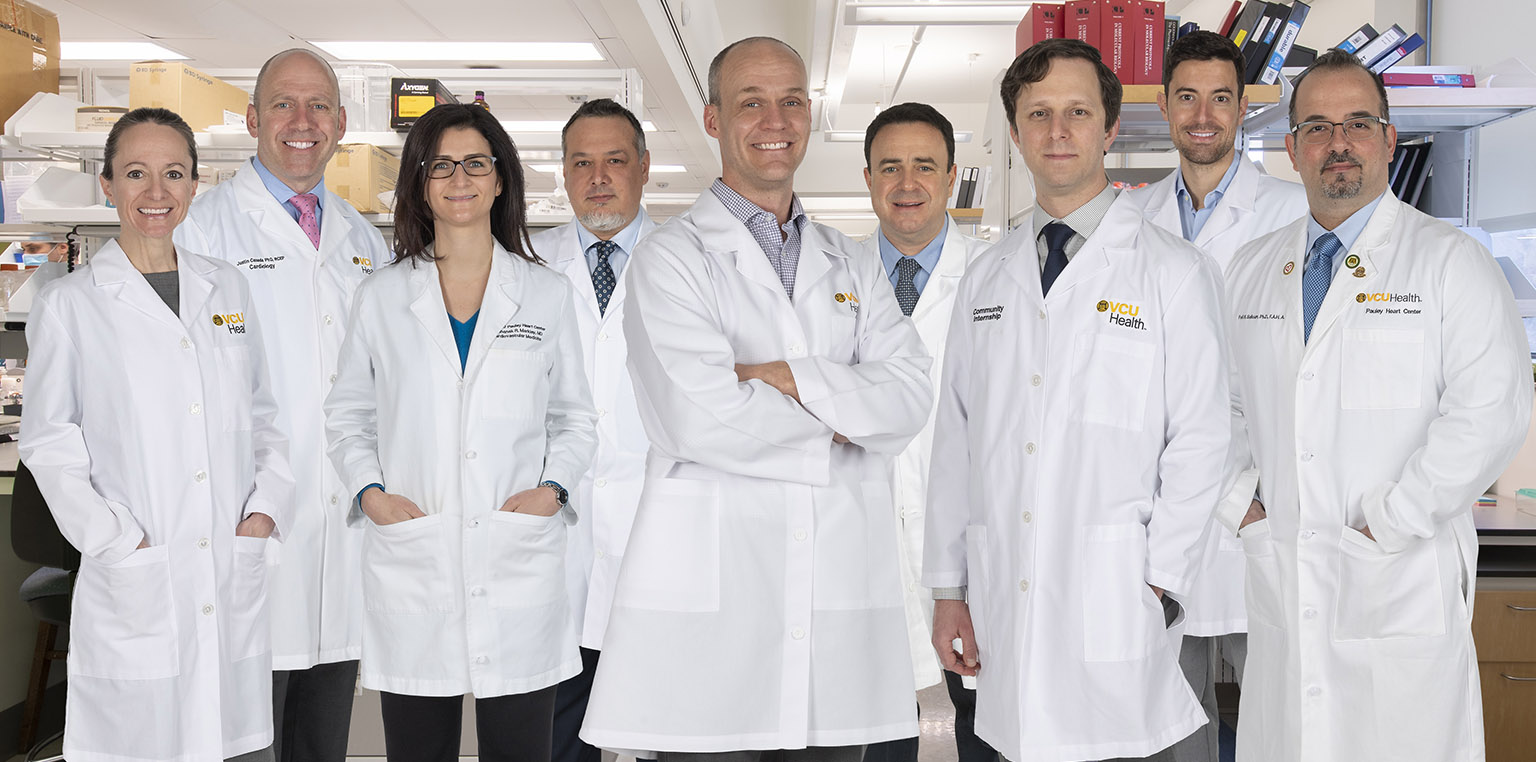Inflammation and the heart
Pauley experts are renowned worldwide for researching critical links

The body produces inflammation — marked by redness, heat, swelling and pain — as a natural and protective response to injury. In the case of cardiac patients, inflammation often occurs following a heart attack. But lingering, chronic inflammation is also linked to many diseases, including heart failure.
“The idea that inflammation is involved in heart disease is not new,” said Antonio Abbate, M.D., Ph.D., Roberts Professor of Cardiology in the Pauley Heart Center and medical director of the Clinical Research Unit in the C. Kenneth and Dianne Wright Center for Clinical and Translational Research.
But a promising new field in cardiology — in which researchers innovate to find a targeted treatment for inflammation — has evolved at VCU Health. Abbate leads a multidisciplinary team conducting clinical and translational research examining the role of inflammation in heart disease. He is also principal investigator or co-investigator on pilot clinical studies funded by the National Institutes of Health, the American Heart Association or industry aimed at identifying novel anti-inflammatory therapies for patients with acute myocardial infarction or heart failure.
Over the past 20 years, preclinical studies and early stage clinical trials at VCU Health have generated meaningful data advancing the understanding of inflammation and the heart. This research has earned international recognition for Pauley, Abbate and his colleagues.
Here are highlights of their recent work.
Mediating the cardiotoxicity of cancer drugs
Sterile inflammation, or inflammation in the absence of a pathogen, has been linked to aggravating numerous disease processes, including the aftermath of injury to the heart. This injury may be a result of a heart attack or exposure to cardiotoxic agents including FDA-approved treatments for certain types of cancer.
Persistent inflammation in the heart can cause damage or failure. “It is important to identify cardiac conditions that involve persistent inflammation in order to design treatment modalities that specifically target the inflammatory pathways,” said Fadi Salloum, Ph.D., the Natalie N. and John R. Congdon Sr. Endowed Chair at Pauley.
Salloum’s research is focused on studying the role of sterile inflammation in mediating the cardiotoxic effects of chemotherapeutic drugs. A seven-year, $5.4 million award from the National Heart, Lung and Blood Institute is funding Salloum’s research program, Managing Cardiac Toxicities of Cancer Therapy. The goal of the research is to better understand the basis of cardiotoxicity — damage to the heart caused by chemotherapy drugs — and inform the discovery of new methods of prevention for chemotherapy-induced heart failure.
“Other studies are also exploring the role of persistent sterile inflammation in animal models of heart attack as well as genetic mutations that lead to Duchenne Muscular Dystrophy-induced cardiomyopathy,” he said. “These studies will pave the way for further development of targeted therapies to blunt sterile inflammation in the heart and its related adverse remodeling and failure.”
From left: Jordana Kron, M.D.; Justin Canada, Ph.D.; Roshanak Markley, M.D.; Stefano Toldo, Ph.D.; Benjamin Van Tassell, Pharm.D.; Antonio Abbate, M.D., Ph.D.; Cory Trankle, M.D.; Salvatore Carbone, Ph.D.; Fadi Salloum, Ph.D.
Blocking inflammation with anakinra
Inflammation is an inevitable response to injury, but too much inflammation leads to more injury.
Abbate and his team have been working on how to modulate the inflammatory response in heart disease so that patients can heal faster and have better cardiac health. In particular, they have started with patients with heart attacks for whom there is a major injury to the heart muscle.
The focus of their studies has been anakinra, a drug that blocks a specific mediator of inflammation called interleukin-1 (IL-1), a small protein in the blood that mediates fever and other inflammatory responses. IL-1 also promotes heart failure following a heart attack.
In heart attacks, there is a clear insult to the heart — a blockage that causes lack of oxygen and cell death and injury. “In other conditions like heart failure, the heart is chronically ill, and inflammation is chronically enhanced,” Abbate said. “This chronic inflammation contributes to heart dysfunction. By resetting the inflammation, some can help improve cardiac function and help heart failure patients do better, feel better and possibly keep them out of the hospital.”
Recently, the team has looked at inflammation of the pericardium, the sack around the heart. In some instances, the pericardium becomes inflamed, a condition called pericarditis. “In a small number of patients, this pericarditis becomes incessant, recurrent and problematic, and it doesn’t stop until patients are put on powerful anti-inflammatory drugs,” Abbate said. “We participated in studies where we tested different anti-inflammatory drugs and showed that when you block that inflammatory vicious cycle, patients can heal from chronic recurrent pericarditis.”
For many years, studies of targeted anti-inflammatory drugs in heart attacks and heart failure were unique to VCU, Abbate said. Notably, VCU has become internationally renowned for its VCUART and REDHART studies focusing on inflammation and centered around blocking IL-1 in heart disease. Abbate and colleague Benjamin Van Tassell, Pharm.D., are co-principal investigators.
With active NIH funding for the past 10 years building on research from earlier clinical trials, and with another multimillion dollar grant awarded in February, the upcoming IL-1 blockade in STEMI trial 4 study will enroll patients with heart attacks and integrate cardiac magnetic resonance imaging and exercise testing to learn if these combined measures prevent patients from developing heart failure. Eighty-four patients will be treated over a period of approximately five years.
Concurrently, an ongoing NIH-sponsored study of heart failure patients is the phase II clinical trial of anakinra called REDHART2, designed to expand and confirm a beneficial effect of sustained anakinra treatment on aerobic exercise capacity. “We know that inflammation has a negative effect on cardiac function, which becomes even more problematic in patients with heart failure,” Van Tassell said. With prior studies already pointing toward improvements in patients with heart failure who receive IL-1 blockade, Abbate said that the team hopes “the treatment will keep the inflammation low, improve their symptoms of heart failure, improve their exercise capacity and keep them out of the hospital. We’ll have the results in a couple of years.”
Devising an alternative therapy sarcoidosis
Another area of focus for the Pauley team is cardiac sarcoidosis, an inflammatory condition in which groups of immune cells form granulomas in different areas of the heart. While sarcoidosis can involve almost any organ system, sarcoidosis of the heart can be life-threatening, causing issues including arrhythmias, heart failure and death.
The team is looking at anti-inflammatory treatments outside of the standard treatment of steroids to see if they can help patients with cardiac sarcoidosis heal inflammation faster or better. “The field of cardiac sarcoidosis, and sarcoidosis in general, really needs new mechanistically driven therapies,” said Jordana Kron, M.D., a professor in the VCU School of Medicine and a cardiologist at Pauley.
In 2019, Kron was awarded a $50,000 Pauley Pilot Research Grant to investigate a new treatment protocol for cardiac sarcoidosis. The 15-month philanthropic grant is being used to evaluate the efficacy and safety of using anakinra to treat patients who present with cardiac sarcoidosis. The study was the first of its kind to explore the new treatment paradigm. This pilot study led to a larger study funded by an R21 grant from the National Center for Advancing Translational Sciences at the NIH and by a Collaborative Science Award study from the American Heart Association in which patients with cardiac sarcoidosis are treated with anakinra.
“A new, safe and effective treatment could be life-altering for patients with cardiac sarcoidosis,” said Kron, a translational science scholar at the VCU C. Kenneth and Dianne Wright Center for Clinical and Translational Research. “It may also open the door for new therapies for cardiac sarcoidosis and other inflammatory heart diseases in the future.”
Identifying therapies for patients with HFpEF
Possibly due to comorbidities like diabetes and obesity, data shows that heart failure patients with preserved left ventricular ejection fraction (HFpEF) have higher inflammation in their bloodstreams. Roshanak Markley, M.D., associate professor of medicine in internal medicine and radiology at VCU Health, believes that’s no coincidence. An 18-month study led by Markley uses a novel perfusion technique and MRI to explore possible links among inflammation, microvascular disease and HFpEF.
“If we can find a link and identify these high-risk patients with inflammation and microvascular disease, then we can create therapies to target inflammation, restore microvascular blood flow, and hopefully improve their exercise tolerance and quality of life,” she said.
The hypothesis of Markley’s study suggests that inflammation induces coronary microvascular disease (CMD), leading to impairment of diastolic function and exercise capacity. Markley explores the strength of correlation among CMD, diastolic impairment and inflammatory biomarkers.
Recruited from referrals across VCU Health, the study includes 20 men and women but aims to key in on a prevalence for HFpEF among females. By administering adenosine and increasing blood flow in the heart, the researchers image the perfusion in the heart using a novel sequence that can calculate the myocardial blood flow and create a perfusion map for more accurate assessment of blood flow. Subjects will also undergo an echocardiogram to assess for impairment in diastolic function and laboratory assessment of inflammation in the blood.
Linking diet, obesity and inflammation
An unhealthy diet and obesity can trigger an inflammatory response and heart failure. That’s the premise behind research into diet and obesity performed by nutritionist Salvatore Carbone, Ph.D., assistant professor in the Department of Kinesiology & Health Sciences, College of Humanities & Sciences, and an affiliate assistant professor at Pauley. Carbone investigates the effects of diet, specific macronutrients such as dietary fatty acids, also known as dietary fats, and simple carbohydrates, known as sugars, on the cardiovascular system.
Since he joined VCU, Carbone has worked closely with Abbate, Van Tassell and Stefano Toldo, Ph.D., in both preclinical laboratory and clinical settings. His initial preclinical work had shown that a diet rich in saturated fatty acids, particularly when associated with a diet rich in sugars (the Western diet), could rapidly worsen cardiac function and glucose metabolism. Importantly, this dysfunction could be partially reversed when switched back to a healthy diet low in both saturated fatty acids and sugars.
Additionally, his research showed that many of the detrimental effects of an unhealthy dietary pattern are mediated by pro-inflammatory cytokines (inflammation), namely IL-1 and IL-18. In fact, mice that are fed a Western diet express higher levels of these cytokines in the circulation as well as specifically in the heart cells, which can, in turn, weaken the heart’s ability to contract and relax.
Furthermore, his research revealed that an anti-inflammatory medication specifically targeting IL-1 and IL-18 provided protection from the detrimental effects of the unhealthy diet. Similarly, switching saturated fatty acids with unsaturated fatty acids (also known as “healthy dietary fats”) found in food such as olive oil, canola oil, nuts and avocados, could also reduce the expression and the production of these pro-inflammatory cytokines. These results provided great advances to the field of nutrition and cardiovascular diseases, demonstrating that unhealthy diet can weaken the heart; the negative effects of the Western diet are mediated by specific pro-inflammatory cytokines; and those cytokines can be blocked by using a pharmacologic approach or by modulating the quality of the fats, specifically switching from unhealthy fats (i.e., saturated fatty acids) to healthy fats (i.e., unsaturated fatty acids).
Our experts
VCU Health Pauley Heart Center faculty researching inflammation include:
Preclinical studies:
- Antonio Abbate, M.D., Ph.D.
- Fadi Salloum, Ph.D.
- Stefano Toldo, Ph.D.
Clinical studies:
- Antonio Abbate, M.D., Ph.D.
- Justin Canada, Ph.D.
- Salvatore Carbone, Ph.D., FHFSA
- Jordana Kron, M.D.
- Roshanak Markley, M.D.
- Cory Trankle, M.D.
- Benjamin Van Tassell, Pharm.D.
Back to Spring-2022



